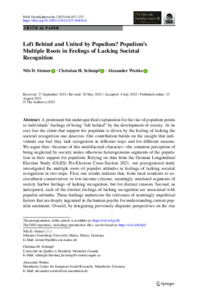|
Left behind and united by populism? Populism’s multiple roots in feelings of lacking societal recognition
Steiner, Nils D.
;
Schimpf, Christian H.
;
Wuttke, Alexander
![[img]](https://madoc.bib.uni-mannheim.de/62631/2.hassmallThumbnailVersion/s11615-022-00416-4.pdf)  Vorschau |
|
PDF
s11615-022-00416-4.pdf
- Veröffentlichte Version
Download (1MB)
|
|
DOI:
|
https://doi.org/10.1007/s11615-022-00416-4
|
|
URL:
|
https://link.springer.com/article/10.1007/s11615-0...
|
|
URN:
|
urn:nbn:de:bsz:180-madoc-626318
|
|
Dokumenttyp:
|
Zeitschriftenartikel
|
|
Erscheinungsjahr:
|
2023
|
|
Titel einer Zeitschrift oder einer Reihe:
|
Politische Vierteljahresschrift : PVS
|
|
Band/Volume:
|
64
|
|
Heft/Issue:
|
1
|
|
Seitenbereich:
|
107-132
|
|
Ort der Veröffentlichung:
|
Wiesbaden ; Baden-Baden
|
|
Verlag:
|
Springer VS ; Nomos
|
|
ISSN:
|
0032-3470 , 1862-2860
|
|
Sprache der Veröffentlichung:
|
Englisch
|
|
Einrichtung:
|
Außerfakultäre Einrichtungen > MZES - Arbeitsbereich B
|
|
Bereits vorhandene Lizenz:
|
 Creative Commons Namensnennung 4.0 International (CC BY 4.0) Creative Commons Namensnennung 4.0 International (CC BY 4.0)
|
|
Fachgebiet:
|
320 Politik
|
|
Abstract:
|
A prominent but underspecified explanation for the rise of populism points to individuals’ feelings of being “left behind” by the development of society. At its core lies the claim that support for populism is driven by the feeling of lacking the societal recognition one deserves. Our contribution builds on the insight that individuals can feel they lack recognition in different ways and for different reasons. We argue that—because of this multifaceted character—the common perception of being neglected by society unites otherwise heterogeneous segments of the population in their support for populism. Relying on data from the German Longitudinal Election Study (GLES) Pre-Election Cross-Section 2021, our preregistered study investigated the multiple roots of populist attitudes in feelings of lacking societal recognition in two steps. First, our results indicate that, from rural residents to sociocultural conservatives or low-income citizens, seemingly unrelated segments of society harbor feelings of lacking recognition, but for distinct reasons. Second, as anticipated, each of the distinct feelings of lacking recognition are associated with populist attitudes. These findings underscore the relevance of seemingly unpolitical factors that are deeply ingrained in the human psyche for understanding current populist sentiment. Overall, by integrating previously disparate perspectives on the rise of populism, the study offers a novel conceptualization of “feeling left behind” and explains how populism can give rise to unusual alliances that cut across traditional cleavages.
|
 | Dieser Eintrag ist Teil der Universitätsbibliographie. |
 | Das Dokument wird vom Publikationsserver der Universitätsbibliothek Mannheim bereitgestellt. |
 Suche Autoren in Suche Autoren in
Sie haben einen Fehler gefunden? Teilen Sie uns Ihren Korrekturwunsch bitte hier mit: E-Mail
Actions (login required)
 |
Eintrag anzeigen |
|
|
 ORCID: 0000-0002-9579-5357
ORCID: 0000-0002-9579-5357



 Creative Commons Namensnennung 4.0 International (CC BY 4.0)
Creative Commons Namensnennung 4.0 International (CC BY 4.0) Suche Autoren in
Suche Autoren in